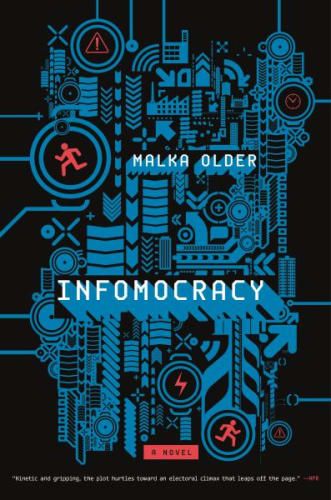Another selection from Austin Feminist Sci-Fi Book Club! Alas, I had to miss the meeting for this book because sometimes sacrifices must be made to keep the tabletop RPG campaign going.
Malka Older’s Infomocracy opens on the eve of a major international election. We’re in a near but unspecified future, where nation states are (largely) a thing of the past and people instead live in enclaves of 100,000 that elect a governing party every ten years: microdemocracy. This is due in no small part to the machinations of the tech giant blandly called “Information,” which functions as a kind of worldwide ISP mixed with search engine and public media. Somehow the rise of Information-the-service led to the rise of microdemocracy, though exactly how is unclear.
These governing parties are global in scale, so you could have a chunk of what is now Australia and a chunk of what is now Brazil governed by the same party; you could have two adjacent chunks of Australia governed by completely different parties. The party with the most enclaves is declared the Supermajority, which grants them some kind of governing advantage. The reigning supermajority, the Heritage party, is losing votes and looking for a way to stop bleeding out. A renegade reactionary party is blowing up by insinuating that military conquest will be on the docket if they become the new Supermajority. Through all of this we follow three characters with interests that are often unaligned or even flat-out competing as they navigate a tumultuous election rocked by fraud and hacking attempts.
There’s thrills, there’s intrigue, there’s speculation about how technology will continue to develop. Much of the book clearly draws on Older’s experience in humanitarian aid and natural disaster response, which makes her near-future feel much more grounded and connected to the present day than, say, something like Star Trek. Top notch world-building all around. The best example of the complexity and thought that Older put into it is the sheer number of parties that turn up in the book. Only a handful are in focus for the big important plot stuff (Heritage, Liberty, Policy1st), but nonetheless an easy dozen or so come up in passing and yet manage to maintain a distinct personality and agenda. Nestlé is a party in this future. So is PhilipMorris. (Is that any different from today oh ho ho.) Then you have groups like All4One/AllFor1, YourStory, LesProfessionels, 888, Free2B, SecureNation, Earth1st, one that uses Kanji that I’m never going to remember, others that are essentially theocracies, still others that are vestiges of the idea of a nation state (1China), and others that are entirely unknown to our characters as they zoom around the world. A lazier writer would have capped it at four or five, but Older went all in. Respect.
Infomocracy ends on a bit of a cliffhanger. I say “a bit” because while most of the narrative threads get conclusively resolved, they still set the stage for some further intrigue down the line. So I just went ahead and checked the next two books out of the library and we’ll see if I finish them before my vacation at the end of the month!

